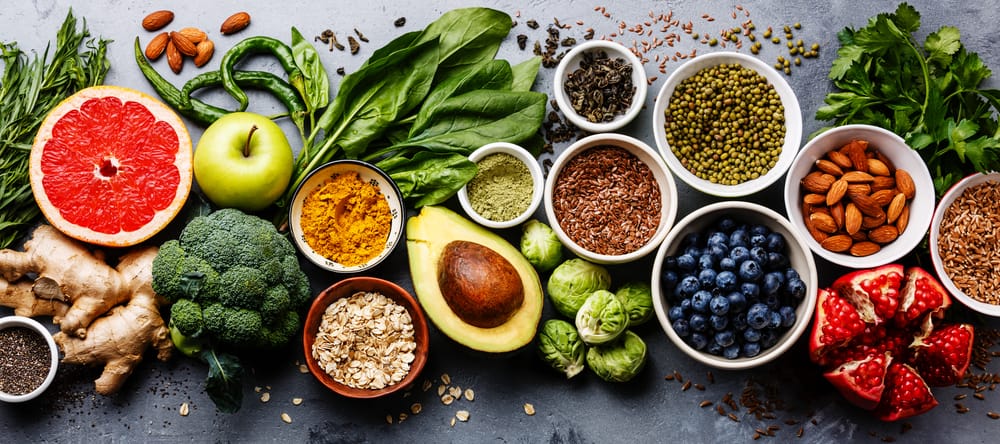It has been known for some time that what we eat can reveal connections between the gut and the immune system, but there is still so much we don’t yet know.
For those of us who subscribe to the Zoe COVID-19 app, you may have recently read an article where they found in their studies that a diet rich in fruit and vegetables had a protective effect against COVID. A somewhat bold claim as it is usually a bit more complicated than that. However, it is true that 70% of our immune system resides in the gut so it would make sense that we should take care of our gut health, and eating more plants is a great way to start – whatever our preferred way of eating.

Just this month, there was an interesting set of findings of a 17-week study published in Cell comparing the results of a plant based high fibre diet with a diet high in fermented foods (foods that contain probiotics) (1). It concluded that fermented foods may be faster at remodelling the gut microbiome. They noted two things – first, the diversity of the gut microbiome increased and second, inflammatory markers were reduced. They were however, eating six portions a day – both dairy and vegetable ferments. For those in the high fibre group – the immune responses were much more personalised and less clear cut.
One of my favourite reviews was published in 2019 (2) where the micro and macro nutrients of several different ways of eating were considered (vegan, vegetarian, ketogenic, Mediterranean, high sugar, low FODMAP, western-type and gluten-free), in order to better understand what might be considered an optimal diet for a healthy gut, and ultimately the consequences on our immune system. The Mediterranean diet and the plant-based diets were the two ways of eating that produced the greatest diversity of micro-organisms. Our guts are like our gardens, we have to plant, feed and weed regularly if they are to be at their very best.
So where to start?
With clients, I always start with small changes and build up gradually – that way, it is more likely that new habits can be created. Here are eight ideas – whether you dislike anything remotely healthy but know you should really eat more, or if you already eat well, but would like to do more.
Start with an apple a day. Your Gran was right. Apples feed the beneficial bacteria in our gut to produce butyrate, a substance which plays an important role in the health status of our gut. Pectin, directly under the skin of the apple is where the most beneficial substance is, so eat the peel. Raw or cooked is fine. Make a batch of stewed apple for the week (no sugar), maybe some cinnamon, leave the skin on and keep in the fridge. Eat with your breakfast or have it for dessert.
Switch yogurt for kefir (a fermented drink). Whilst yogurt (natural, unsweetened), contains some probiotics, kefir contains much more and therefore a better choice for gut health. Dairy and non-dairy kefir is widely available in supermarkets. Great paired with fruit for breakfast. Freezing does not kill the beneficial bacteria in kefir, so blend with some bananas and berries and make ice lollies.

One root vegetable and two other plants a day. If the idea of eating more plants seems overwhelming to you, three different types a day is a great place to start. Consistency is key – so every single day – work up to six teacups full.
Plants (ideally veg) with every meal. Most people can do lunch and dinner but often struggle with breakfast. Think a few salad leaves, avocado or tomato with eggs, or some spinach hidden in a fruit smoothie.
Half of the plate filled with veg. I’m talking mostly plants not grains – so not half a plate of pasta. Variety is important, so not half a plate of carrots. Try for at least two, eg carrots and chickpeas, then see if there is room for something green too. Colours are important as they each provide different nutrients. Remember the expression “eat the rainbow”.
Give kimchi or sauerkraut a try. These fermented vegetables are a great way to increase probiotics but start slowly – it takes a while to build up tolerance. One small portion a day to begin with.
30 plants a week. For the dedicated. This can be done as a challenge and is fun way to encourage kids to increase the amount of plants in their diet. Individuals who eat at least 30 different plants each week have more varied gut bacteria. You can download a fun challenge chart to stick on your fridge here. Add nuts, seeds and berries to your breakfast, mixed salad or soup for lunch, fruit and nuts for snacks, maybe a plant-based meal or two a few times a week for dinner, eg veggie chilli con carne, lentil burgers, or just an extra portion of veg on the side. Make liberal use of the freezer – frozen veg are often better than fresh.
Swap alcohol for kombucha. Kombucha is a fermented tea and is a potential source of probiotics and antioxidants. Only a small glass in order to build up tolerance slowly is all that is needed. Pick a low sugar variety – it’s only healthy when made properly.
References:
- Wastyk, et.al. (2021). Gut-microbiota-targeted diets modulate human immune status. Cell, 0(0). https://doi.org/10.1016/j.cell.2021.06.019
- Rinninella, et.al. (2019). Food components and dietary habits: Keys for a healthy gut microbiota composition. In Nutrients (Vol. 11, Issue 10). MDPI AG. https://doi.org/10.3390/nu11102393
By: Karen Geary

